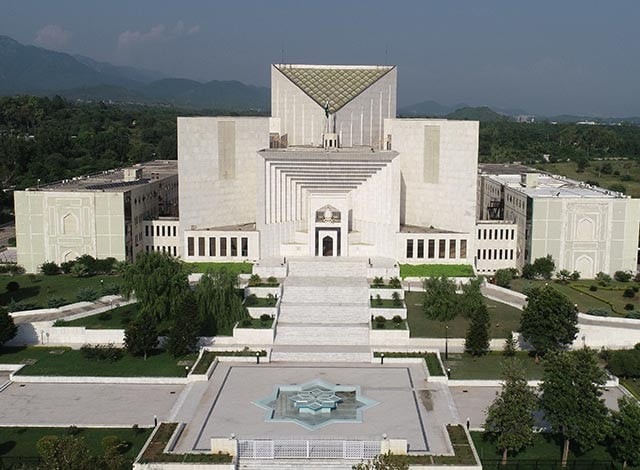SC reserves verdict in SIC reserved seats case
CJP Qazi Faez Isa says decision will be announced after due consultation

The Supreme Court's (SC) full bench led by Chief Justice Pakistan (CJP) Qazi Faez Isa has reserved its verdict regarding the Sunni Ittehad Council's (SIC) case on reserved seats, requesting to dismiss SIC’s appeal and uphold the verdict of the Peshawar High Court (PHC) on the matter.
The full court, led by CJP, heard the case. The Election Commission of Pakistan (ECP) has already submitted a written response to the apex court, stating that the SIC is no longer entitled to the reserved seats. It reiterated that the SIC’s eligibility was compromised on several grounds.
The court announced that the reserved verdict on the SIC case will be announced after consultation.
Today's hearing
At the outset of the hearing, Faisal Siddiqui, a senior counsel representing the SIC, raised significant allegations against the ECP, accusing it of failing to fulfil its duties transparently.
"Their [Election Commission's] response on allegations of dishonesty regarding reserved seats for the Balochistan Awami Party was inadequately substantiated," SIC's counsel contended.
He cited that in 2018, the Balochistan Awami Party (BAP) did not win any seats, but they were allocated three reserved seats.
The chief justice pressed for clarity on the ECP's adherence to constitutional texts in their decision-making processes, asking, "Was the Election Commission's decision regarding reserved seats for the Balochistan Awami Party under the law?"
To which the SIC's counsel responded that the ECP had not conducted a transparent allocation process for reserved seats, as he cited precedents and legal texts to support his arguments.
"Did the Balochistan Awami Party participate in the elections in Khyber-Pakhtunkhwa?" asked Justice Irfan Saadat.
Advocate Siddiqui clarified that the Balochistan Awami Party participated but did not win any seats.
"Political parties cannot be arbitrarily denied their rightful share of representation," CJP Isa remarked.
CJ Jamal Khan Mandokhail queried, "Is the Election Commission treating all political entities equally in terms of seat allocation?"
The court noted that there is a distinction between political parties and parliamentary decisions made within Parliament.
"Political parties do not have the authority to make such decisions," Justice Jamal Mandokhail emphasized while noting that parliamentary parties are not bound to follow political decisions.
He continued, "Just as the prime minister cannot vote, parliamentary parties are not bound to implement political party decisions."
"You're absolutely right," acknowledged Siddiqui as Mandokhail's statement drew laughter from the courtroom.
The court raised a question regarding what would happen if a political party were to secure seats in several provinces but none in a particular province.
"The Balochistan Awami Party won seats in other provinces but none in Khyber-Pakhtunkhwa. The Election Commission's lack of transparency is evident," Siddiqui accused.
"Do you want the Supreme Court to take judicial notice?" CJP Isa inquired.
He continued, "If not, why mention it? If you want to file a case regarding the 2018 elections, do it"
The SIC's counsel Advocate urged if the "Election Commission was behaving discriminatorily, the Supreme Court should examine it."
"Does this mean the 2018 Election Commission was correct?" the CJP further questioned.
"The Greeks used to say if they couldn't speak with evidence, they would punish the individual," Siddiqui likened.
"Is the Greek example a good argument? Is it constitutional?" CJP Isa probed.
"Not a good argument, but their [ECP's] hypocrisy is evident," Siddiqui countered.
Justice Mandokhel queried the potential implications for those individuals who are associated with the Pakistan Tehreek-e-Insaf (PTI) but later joined the Sunni Council (SIC).
"If an independent candidate declares affiliation, they can join it [SIC]," PTI's legal counsel Salman Akram Raja said.
The PTI's counsel explained that PTI-backed SIC candidates did have any other choice apart from joining SIC. He further noted that whatever precedent ECP set about independents before was their fault.
The court has reserved the verdict and adjourned the hearing.
The ECP on March 1 refused to allot these reserved seats to the SIC. The Peshawar High Court (PHC) on March 25 also upheld the ECP order, prompting the SIC to approach the apex court.
Earlier, ECP told the Supreme Court that the SIC’s constitution is violative of articles 17, 20 & 25 of the Constitution and the party is not entitled to any reserved seats for women and in particular for non-Muslims.
The ECP on December 22, 2023, stripped the PTI of its election symbol in view of irregularities in its intra-party polls. The Supreme Court on January 13 upheld the ECP order, forcing the PTI candidates to contest the February 8 general elections as independents.
The independent candidates joined the SIC after the announcement of official election results. The SIC later sought reserved seats in the parliament and provincial assemblies in proportion to its general seats.



















COMMENTS
Comments are moderated and generally will be posted if they are on-topic and not abusive.
For more information, please see our Comments FAQ